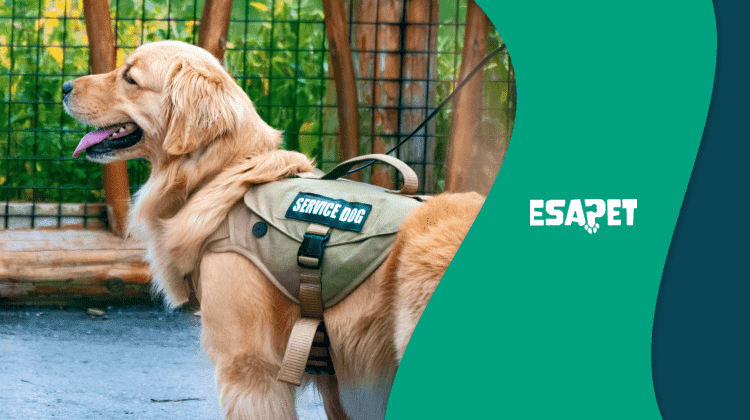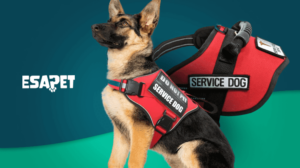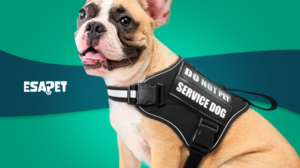Psychiatric Service Dog Training and Certification Guide

PSDs are specially trained dogs that assist individuals with mental conditions. They perform crucial tasks that help their handlers manage symptoms and improve functioning. The process of psychiatric service dog training involves learning both specialized tasks and public access skills.
What is a Psychiatric Service Dog (PSD)?
A PSD is a specially trained dog that helps people with mental illness or psychiatric disabilities. These dogs are not just pets. They perform vital tasks that assist their handlers in daily life. Their presence helps manage symptoms and improve the quality of life.
Unlike Emotional Support Animals, PSDs undergo rigorous training. An emotional support animal provides comfort through their presence but is not trained to perform tasks. Service animals, like PSDs, are legally recognized to assist with disabilities.
PSDs perform various tasks tailored to their handler’s needs. Common duties include deep pressure therapy, which can help reduce anxiety. They may also remind their handlers to take medication. Their assistance allows individuals to regain control over their symptoms.
How to Train Your Psychiatric Service Dog
Training a PSD requires patience and careful planning. The process starts by teaching the dog simple commands that build structure. As training continues, the focus shifts to more complex tasks. These tasks allow the dog to assist with the handler’s mental health challenges.
Choosing a dog for PSD training is about more than just breed. It’s about finding the right fit. Observe how potential dogs react in various environments. Dogs that can handle stress and stay engaged are better suited for PSD work.
Once you select the dog, the training plan should be individualized. Start with basic commands and gradually increase the difficulty. It’s essential to make adjustments to meet the dog’s progress and the handler’s needs.
PSD Training Requirements
PSDs need to learn both basic and specialized skills. Basic obedience is essential, ensuring the dog listens in public. Common tasks include deep pressure therapy to help calm anxiety and medication reminders. These tasks make the dog a reliable service animal.
Choosing the Right Dog for PSD Training
Not all dogs can become PSDs. It is important to choose a breed known for intelligence, calmness, and focus. Breeds like Labradors, Poodles, and Golden Retrievers often excel. Personality is key, too. Look for a dog that is eager to learn and respond to training.
Developing a Training Plan for Your PSD
Creating a structured plan helps ensure success. Begin with basic obedience, then move to specific psychiatric tasks. Gradually introduce public access training, where the dog learns to stay calm in busy places. This plan ensures your dog is well-prepared for real-world challenge.
Self-Training vs. Professional Training for PSDs
You can train a PSD yourself or through a professional. Self-training can save money but takes time and patience. It also builds a close bond between the handler and the dog. However, it requires a strong understanding of dog training techniques.
Professional training offers more structure. It ensures the dog learns specific skills efficiently. For those without much training experience, professional help can be invaluable. It reduces mistakes and speeds up the process. However, this option is more expensive.
Pros and Cons of Self-Training a Psychiatric Service Dog
Self-training a PSD has both benefits and challenges. It’s cheaper than professional training and strengthens the bond between a handler and a dog. However, it takes time and patience. Without expertise, mistakes can slow progress.
Pros
- Cost-effective
- Builds a strong bond
- Flexible schedule
Cons
- Requires time and patience
- Risk of mistakes
- May lack structure
When to Hire a Professional Trainer for PSDs
Hiring a professional trainer is helpful if you lack experience in dog training. They can teach your PSD faster and more effectively. A trainer ensures that both the dog and handler learn essential tasks. This option works well for people who struggle with self-training.
Finding PSD Training Programs
To find reputable psychiatric service dog training programs, check reviews and testimonials. Look for programs with experience training PSDs specifically. Ensure they cover essential skills. Verify certifications and ask for recommendations from trusted sources.
Types of Psychiatric Service Dog Training
PSDs receive specialized training to assist with specific mental health conditions. They are trained to perform various psychiatric service dog tasks. These tasks are essential for supporting their handler’s mental health needs.
Besides task-specific training, PSDs must learn to navigate different environments. This includes crowded places, noisy streets, and other public settings. The goal is to ensure that the dog remains calm and focused.
Each trained service dog undergoes extensive preparation. This helps ensure it can behave appropriately in public. The dog must be reliable in various situations, whether at home or in a busy area. Below are more details about the different types of training these dogs receive.
Deep Pressure Therapy Training
This training teaches the dog to apply gentle pressure on their handler’s body during panic attacks. The pressure helps to calm the handler by slowing their heart rate and providing a sense of security.
Medication Reminder Training
PSDs learn to nudge or paw at their handler to remind them to take their medication on time. This task is crucial for individuals who struggle with memory or focus due to their condition. It ensures they maintain their treatment routine.
Anxiety Interruption Training
Dogs are trained to recognize the signs of an impending anxiety attack in their handler. They may lick, nudge, or place a paw on the handler to help disrupt the anxiety and redirect their attention.
Public Access Training
This focuses on teaching the dog to remain calm and well-behaved in public. PSDs learn how to navigate crowds, ignore distractions, and follow commands. This ensures they can accompany their handler to any location.
Night Terror Response Training
Some PSDs are trained to assist their handlers during episodes of night terrors. They may wake the handler by nudging or licking them. This helps to bring them out of distressing sleep patterns.
Safety Check Training
This task involves teaching the dog to enter a room before their handler to assess if it is safe. It’s particularly helpful for individuals with post-traumatic stress disorder (PTSD). This gives them confidence in entering new or unfamiliar spaces.
Task-Specific Training for Psychiatric Service Dogs
Task-specific training focuses on preparing PSDs to handle their handler’s mental health challenges. For anxiety reduction, dogs are trained in DPT. The dog applies its weight to help calm the handler during panic. This physical contact eases anxiety symptoms.
Grounding techniques are also taught in this phase. Dogs learn to gently nudge or paw their handler to help break cycles of anxiety or dissociation. This action brings the handler back to the present moment. PSDs are trained to alert their handler when it’s time for medication.
Public Access Training and Socialization for PSDs
Public access training ensures PSDs behave appropriately in public spaces. The dog must stay calm, focused, and responsive in various environments. The PSD learns to ignore distractions like people, animals, and loud noises. This helps ensure they remain attentive to their handler.
Desensitization Training for Various Environments
Desensitization training helps PSDs handle noisy and unpredictable settings. During training, the dog is exposed to different environments, such as crowded areas or busy streets. This exposure teaches them to stay calm. It ensures that the dog remains reliable in any situation.
Cost of Training a Psychiatric Service Dog
Training a PSD can be a significant financial commitment. The cost depends on the type and level of training. Each stage of training, from basic obedience to specialized tasks, involves different expenses. Understanding these costs helps prepare for the full investment needed.
Basic obedience training forms the foundation for all PSDs. As the training progresses, costs rise with the introduction of psychiatric-specific tasks. Below is a breakdown of these essential training costs.
- Basic Training Costs
Basic obedience classes are the first step in PSD training. These classes teach foundational skills like sit, stay, and recall. These classes range from $100 to $300 for group lessons. Private sessions can cost more, often reaching $500 or more. - PSD Task-Specific Training Costs
Task-specific training focuses on teaching the dog psychiatric tasks. This is where the dog learns specialized skills. These sessions can be expensive, ranging from $2,000 to $10,000. This also depends on the complexity and duration of the training. - Social Education and Public Access Training Costs
Public access training ensures the dog behaves appropriately in public settings. Group socialization and public access training classes cost between $500 and $1,500.
Finding a Professional Trainer or Training Program
Choosing the right dog trainer or program for a psychiatric service dog (PSD) is essential. Look for trainers who specialize in PSD tasks and have experience with mental health conditions. Public access training is also important to prepare the dog for public settings.
When selecting a program, focus on those accredited in PSD training. Look for programs offering services like basic obedience, task-specific training, and public access preparation. Below, we will explore more about finding the right dog trainer and training programs.
How to Choose a Qualified Service Dog and Emotional Support Animals Trainer
When choosing a dog trainer, look for key qualities. The trainer should have certification in service dog training and experience with PSDs. The trainer should have a solid reputation and verifiable references. They should offer a clear training plan tailored to your dog’s needs.
Best Psychiatric Service Dog Training Services Near You
Start by searching terms like “PSD trainer,” “certified PSD training programs,” or “service dog training for mental health.” Look for trainers with certifications from organizations like ADI or IACP. Read reviews and testimonials and ask for references to verify the trainer’s experience.
State-by-State Guide to Certified PSD Trainers
Finding the right certified psychiatric service dog (PSD) trainer is essential. It ensures your dog is trained to assist with mental health conditions.
Below is a comprehensive list of certified trainers across all 50 states. This section will help you locate certified dog trainers near you.
- Alabama
Alabama Dog Trainer (Odenville)
Dog Training Elite Huntsville (Huntsville) - Alaska
Alaska Dog Works (Anchorage)
Anchorage Dog Training (Anchorage) - Arizona
Desert Sky K9 (Phoenix)
Handi-Dogs (Tucson) - Arkansas
Arkansas Service Dogs (Gibson)
R & R Kennels (Pottsville) - California
Total K9 Focus (Corona)
Service Dog Tutor (San Mateo)
San Diego Service Dogs (San Diego) - Colorado
Faithfully K9 (Denver)
Traction Dog Training (Boulder) - Connecticut
Heart of Gold Canine (Watertown)
Dog Training CT (Shelton) - Delaware
Delaware K9 Academy ((Wilmington)
Academy of Dog Training and Agility (Newark) - Florida
Canines 4 Hope (Palm City)
iDog Academy (Palm City) - Georgia
CPT Training (Atlanta)
Peach on a Leash (Atlanta) - Hawaii
Balanced Obedience (Kailua) - Idaho
Companion Training (Boise)
Saragold Kennel (Twin Falls) - Illinois
Canines 4 Comfort (Round Lake)
Dog Training Elite (Chicago) - Indiana
Medical Mutts (Indianapolis)
Carmel Dog Zone (Carmel) - Iowa
Dog Training Elite (Des Moines)
Iowa Service Dogs (West Des Moines) - Kansas
Mutt School (NE Kansas)
Family Dog Training & Behavioral Center (Wichita) - Kentucky
Paws With Purpose (Louisville)
Pawsitive Purpose K9 (Central KY) - Louisiana
Always Faithful Dogs (New Orleans)
Dog Training Elite (Baton Rouge) - Maine
Mission Working Dogs (Oxford)
Service Dog Strong (Denmark) - Maryland
American K9 (Davidsonville)
Semper K9 (Quantico) - Massachusetts
Ruff Translating (Boston)
At Your Service Dog Training (Hadley) - Michigan
Michigan Service Dogs (Clarkston)
Clever Canine Dog Training (Waterford) - Minnesota
Aurum Canine Services (South Metro)
Pawsitivity Service Dogs (St. Paul) - Mississippi
Hub City Service Dogs (Hattiesburg)
Faithfully Yours Dog Training (Braxton) - Missouri
St. Louis Huggs (St. Louis)
Precious K9s (Southwest Missouri) - Montana
Wind River Kennels (Florence)
Bark 4 Joy (Helena) - Nebraska
Lost Creek Training (Kearney) - Nevada
Michael’s Angel Paws (Las Vegas)
Smarty Paws (Las Vegas) - New Hampshire
Little Angels Service Dogs (Bartlett) - New Jersey
Pro Canine Center (Frenchtown) - New Mexico
Assistance Dogs of the West (Santa Fe)
Service Dogs New Mexico (Albuquerque) - New York
Dog Relations NYC (New York City)
All Dawgs (Albany)
Russ Hollier Dog Training (Ithaca) - North Carolina
Appalachian Dog Training (Mills River)
Four Paws and a Wake Up (Wilmington) - North Dakota
Service Dog Training School - Ohio
Buckeye K9 (Obetz)
A Better Pet (Cleveland) - Oklahoma
Glad Wags Service Dogs (Tulsa) - Oregon
Compass Key Service Dogs (Portland)
Charlo Training (Portland) - Pennsylvania
Compass Key Service Dogs (Philadelphia)
Digman Canine Academy (Port Matilda) - Rhode Island
Modern Dog Training (East Greenwich) - South Carolina
Dog Training in Your Home (Columbia)
Pawsitively Obedient (Columbia) - South Dakota
Big Paws Canine (Hartford) - Tennessee
K-9 Companions Nashville (Mount Juliet)
CrittersWork (Greeneville) - Texas
Scout’s Legacy Service Dogs (Trenton)
Service Dog Express (Whole state) - Utah
Skye’s Dog Training (West Jordan)
Molli Dogs (Orem, Provo, Sandy) - Vermont
Green Mountain Dog Camp (Roxbury) - Virginia
Ridgeside K9 (Northern Virginia)
K-9 Caring Angels (Northern Virginia) - Washington
Nitro K-9 (Bothell)
Cascade Service Dogs - West Virginia
Fetch and More (Online)
Berkeley K-9 School for All Dogs (Eastern Panhandle) - Wisconsin
Central Wisconsin K-9 (Schofield)
Valkyrie Dog Training (Southeast Wisconsin) - Wyoming
WyoDogs Training (Powell)
Obtaining and Certifying a Psychiatric Service Dog
To obtain a PSD, the first step is to receive a diagnosis from an LMHP. This confirms the need for a service dog under the guidelines of the Americans with Disabilities Act (ADA). The diagnosis establishes the handler’s eligibility to have a PSD.
The dog must be trained to perform specific tasks that assist with your condition. Training should also include public access skills. This helps to ensure the dog behaves well in various environments.
Certification typically involves proving the dog’s ability to perform its tasks and demonstrating good behavior in public. Although PSD certification is optional, it can make navigating public places, travel, and housing situations easier.
How to Get a Psychiatric Service Dog
To get a Psychiatric service dog (PSD), decide whether to adopt a puppy or buy a trained dog. If adopting, work with a certified and professional dog trainer. This helps ensure the dog learns necessary psychiatric tasks. Training can be done in person or online.
Applying for a Trained Psychiatric Service Dog
To apply for a pre-trained PSD, start by researching accredited programs. These programs match trained dogs based on individual needs. You’ll need to provide medical documentation for your diagnosis. Some programs need interviews or assessments to ensure a good match.
Psychiatric Service Dog Certification Requirements and Processes
Certifying a PSD doesn’t need official documentation under the ADA. However, some choose to get certification to provide extra proof of the dog’s qualifications. The certification process shows that the dog can perform specific psychiatric tasks.
You may need to present proof of your dog’s training in certain situations to guarantee PSD legal rights and benefits such as reasonable housing accommodations and in-cabin travel. You may also need to provide evidence of your mental health condition. A PSD Letter provider can offer the documentation. This PSD Letter verifies that the service dog is required to assist with your mental health disability.
Get your Official PSD Letter Consultation from a licensed therapist.
Get PSD Letter Now
Psychiatric Service Dogs Financial Aspects
The financial aspects of obtaining and training a PSD can be significant. Costs range from the initial purchase or adoption to ongoing training and care. It’s important to factor in the expenses of training for tasks, health care, and maintenance.
Training a PSD can be a long-term investment. The cost will vary depending on whether you train a dog or work with a professional.
How Much is a Service Dog?
The cost of a service dog can vary widely. Factors include the breed, training type, and whether the dog is pre-trained or trained by the owner. Prices typically range from $10,000 to $30,000. Specialized PSD tasks or advanced training can further increase the total cost.
Cost Breakdown of a Psychiatric Service Dog
The initial cost of acquiring a PSD can range from $15,000 to $30,000. Ongoing care, which includes expenses for food, vet visits, grooming, and equipment, ranges between $1,000 and $2,500 per year. These ongoing psychiatric service dog costs are necessary to maintain the dog’s health and training effectiveness.
Funding Options for Training and Obtaining a PSD
Various funding options can help offset the cost of a PSD. Grants, financial aid from non-profits, and fundraising are common sources of support. Some health insurance plans may cover parts of the cost, such as training or medical care.
Additional Resources and Support for Psychiatric Service Dog Handlers
PSD handlers can access various resources to help with training, care, and ongoing support. These resources include support organizations, specialized training programs, and online communities. They offer guidance, training tips, legal advice, and emotional support.
Local training groups also provide valuable help. Handlers can connect with others who have similar experiences and offer encouragement. Many of these platforms provide access to expert advice. This ensures that handlers can manage their service dog’s training.
Support Organizations for PSD Handlers
Several organizations assist PSD handlers by providing essential resources and training support. These groups help support the handler and the dog in their journey.
- ESA Pet: Offers service dog certification and diagnosis, comprehensive ongoing support for handlers, and learning resources.
- Assistance Dogs International (ADI): Provides accreditation for service dog organizations and maintains a directory of trainers.
- Canine Companions: Offers a fully trained service dog and ongoing support for individuals with disabilities.
- Paws With a Cause: Assists with training and matching psychiatric service dogs with people who need them.
Frequently Asked Questions About Psychiatric Service Dogs
How Do I Make My Dog a Psychiatric Service Dog?
To make your dog a PSD, you first need to have qualifying mental health illnesses. A licensed mental health professional must diagnose this. Once confirmed, you can begin training your dog to perform specific psychiatric tasks that assist with your condition.
Training can be done through certified programs, or you can train the dog yourself. The dog must learn essential tasks to help with your mental health. It must undergo public access training. This ensures the dog behaves in public spaces and stays focused on you.
What Tasks Does a Psychiatric Service Dog Perform for Anxiety?
PSDs perform a variety of tasks to help manage anxiety. One common task is deep pressure therapy. This is where the dog applies pressure to the handler’s body to calm them during anxiety or panic attacks. This physical pressure can reduce symptoms and provide comfort.
Another key task is grounding. The dog may nudge, paw, or lay close to its handler to break the cycle of anxiety and help them focus on the present moment. The dog may retrieve medication or alert the handler to take it at specific times. This helps with treatment consistency.
Can I Train My Own PTSD Service Dog?
Yes. You can train your service dog for PTSD. Many individuals choose to self-train their dogs. However, this requires patience and knowledge of dog training techniques. To be effective, the dog must learn both psychiatric tasks and public access skills.
Self-training can be challenging without experience. Due to this, some handlers work with certified trainers or enroll in online programs. This helps ensure the dog can reliably perform tasks related to PTSD and behave well in public.
What Is the Difference Between a Psychiatric Dog and a Service Dog?
A PSD is a specific service dog trained to assist with mental health disorders. These dogs perform tasks related to psychiatric disabilities. Their work directly supports their handler’s mental health by mitigating symptoms.
A general service dog is trained to assist with physical disabilities. Psychiatric and service dogs have the same legal rights under the Americans with Disabilities Act (ADA). The tasks they perform differ based on the handler’s needs.
Conclusion
Proper training and certification for PSDs are crucial. They provide the necessary support for individuals with mental health conditions. A well-trained psychiatric service dog can make a significant difference in daily life.
Choosing reputable trainers and programs ensures the dog receives the best preparation. The commitment involved in training a PSD pays off through the invaluable assistance they offer. If you’re considering a PSD, it’s essential to invest in proper training and certification.
For expert guidance on psychiatric service dog certification, training, and support, reach out to ESA Pet today.











